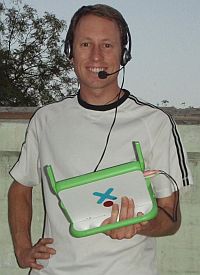I've long been an advocate for selling the XO commercially or at least following a Grameen Village Phone style approach to create OLPC XO-centric small business models. Or simply just enable smaller pilot projects to spread the XO technology. I still believe any or all of these offer amazing benefits to expanding the scale of the OLPC XO, re-establishing the XO as the dominant player in the low-cost, rugged, low-infrastructure-requirements laptop, ideal for education projects around the world.
This doesn't seem to be getting much traction, despite apparent interest. Let me propose a different path forward, closer to the original "we sell laptops in batches of 1 million or more to governments" idea:
Drop the Education Focus.
Don't get me wrong - education is absolutely key to development, and the OLPC XO can be a great tool for education. But education systems also need to invest in teacher training, school infrastructure (from simple, double-ventilated pit latrines all the way to electricity and computers).
But there are so many other areas where something like the XO could help. Anywhere that cell phones are established as data-reporting tools is a potential place to introduce an XO. The laptop is barely more resource-hungry than a cell phone in terms of power, and can work "off-grid" with solar or car batteries just as well.
It can deploy without any central communications grid (unlike a cell phone), given enough XOs or mesh extending devices to maintain an active peer-to-peer mesh network, and add one satellite uplink or cell-modem into the system and you're online. More importantly, if the cell network is down, a mesh network still can pass along messages within a small area.
Even a simple OLPC can still provide a much more rich data reporting toolset than coding long strings of data into a 160 character SMS, not to mention the ability to add in encryption for personal security and not relying (necessarily) on a central network which could be compromised.
What are some areas that such a device could provide valuable tools? Crisis response would be one obvious win, but also health reporting and/or managing reports being filed, human rights violations, election reporting, and even something like agricultural data exchange, enabling farmers to "pull" and explore information on long-term weather forecasts, disease risks, and market prices.
Combine an XO with FrontLineSMS and you have a portable, solar-powered SMS communications hub, which I can see being valuable in a few tough situations if you had some manual encryption schemes set up with your constituents.
Accepted, the XO is more expensive and would require more training than a simple cell phone. It could not - and should not - replace cell phone deployments, as a cell phone can go longer without power and is less "flashy" than an XO.
But hybrid systems involving OLPC XOs as well as cell phones, or using XOs as portable SMS-messaging hubs, or simply to quickly deploy a local area wifi mesh network are all clear needs that an OLPC XO could help with.



It looks like what you propose will be happening with the X0-2. Olpc is going to make the hardware design, in hopes that several different oem's will decide to produce it. And presumably companies that manufacture them for education will want to make more money by also selling them to the general public. And that would likely lead to the rest of your plan.
Eduardo
I'm hopeful for that, but you'll understand if I'm not holding my breath for the XO-2 just yet. Also, I'm not sold that the current XO-2 design is actually an improvement over the XO-1; the screen/keyboard seems much more fragile (and without tactile feedback/home keys for touch-typing).